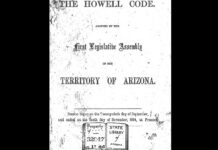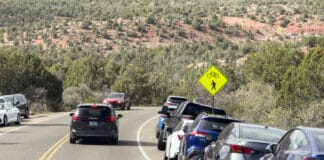Both sides of the political aisle were touting mandatory minimum sentencing for high volume traffickers as a deterrent against the fentanyl epidemic on Wednesday, April 3, as part of a bipartisan press conference in Phoenix at which Gov. Katie Hobbs signed House Bill 2245, sponsored by Rep. Quang Nguyen [R-District 1.
The Ashley Dunn Act was named for a Prescott woman who died from an accidental fentanyl overdose in May 2021 from half of a counterfeit Percocet pill.
“Our state has been flooded with this cheap and deadly drug in recent years, and we need more robust tools to deter those illegally selling large quantities of it in our state,” Arizona Attorney General Kris Mayes stated in an April 3 press release. “This legislation is one of those tools allowing for enhanced penalties for those selling over 200 grams of fentanyl, or the equivalent of 2,000 fentanyl pills.”
“We can no longer accept the status quo,” Hobbs stated during the press conference. “That’s why today I am proud to sign legislation that will hold drug traffickers accountable” before repeatedly calling for “a holistic approach” for additional law enforcement and treatment funding.
The average quantity of drugs found on a trafficker by the Arizona Department of Safety is about 5,000 pills, according to Nguyen, who has repeatedly stated that the bill’s intention is to go after mid-level dealers.
“All those people are going to fall under this law,” Nguyen’s office stated in a press release. “For a first offense, the law sets a minimum sentence of five years and a maximum of 15 years, with repeat offenders facing potential sentences of 10 to 20 years.”
“It’s a deterrent factor and that word actually came right out of [Yavapai County Sheriff] David Rhodes’ mouth,” Nugyen said.
When asked to provide research data that supported the effectiveness of mandatory minimum sentencing as a tool for crime reduction, Nguyen was unable to do so, instead referring to anecdotes from the Prescott Valley Police Department and stating “they probably could have used this [sentencing] two or three times this year.”
Nguyen added that the person who sold Dunn the counterfeit pill “was in and out of jail regularly.”
“Increasing the severity of punishment does little to deter crime,” the federal government’s National Institute of Justice has stated in a fact sheet on mandatory minimums. “Laws and policies designed to deter crime by focusing mainly on increasing the severity of punishment are ineffective partly because criminals know little about the sanctions for specific crimes.”
Rhodes and Ashley Dunn’s mother Josephine Dunn were both at the press conference.
“There is a new tool now and we will use it to find you and to prosecute you and put you in prison and we say consistently, that people — criminals have to believe that the laws will be enforced, and they have to be afraid of the consequences,” Rhodes said during the press conference. “We believe that this key piece of legislation does exactly that.”
Mandatory Minimums
Criminal justice reform advocates argue that increased mandatory minimums exacerbate economic and racial disparities.
Last year, the Joint Legislative Budget Committee estimated that the financial cost for House Bill 2802, a similar piece of proposed legislation, would increase the Arizona Department of Corrections population by 3,200 inmates at an additional annual cost of $2.3 million in FY26, rising to $6.9 million in FY33 and every year thereafter, for staffing, court costs and additional prosecutors and judges.
The data from the previous HB 2802 was included in the fact sheet for the Ashley Dunn Act. Arizona’s imprisonment rate of 446 people per 100,000 residents, according to 2022 data from the Bureau of Justice Statistics, gives the state the seventh highest incarceration rate in the nation, over 314% higher than the 2021 global average of an estimated 142 prisoners for every 100,000 people based on United Nations Office on Drugs and Crime figures.
Overdose Fatality Review Board
“More than half the fentanyl seized in the United States is coming through Arizona,” Nguyen stated in a press release. “An alarming 42 million pills were seized in Arizona in 2023 — 70% of which contained a lethal dose. Fentanyl is wreaking havoc on communities, particularly in my home of Yavapai County.”
The total number of annual deaths in Yavapai County involving fentanyl has remained consistent since 2020, when there were 42 such deaths, which was an increase from 10 in 2019.
The report’s policy recommendations did not include increasing mandatory minimum sentences and called “for regulations or laws on the sale of Dust- Off and other inhalants as it relates to huffing.”
The report’s recommendations included “discuss sentencing with judges to advocate for longer treatment plans to support successful recovery. Advocate for enhanced trauma counseling and mental health treatment in conjunction with substance use treatment, advocate for juvenile and adult probation departments to communicate with, and provide emotional support to, families of probationers who die from an accidental drug overdose,” and to “advocate for effective oversight and monitoring of children in foster care.”






















